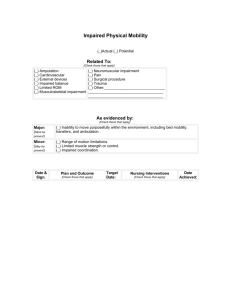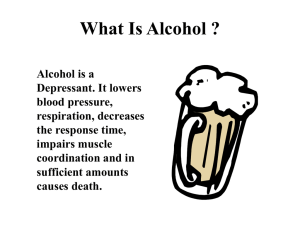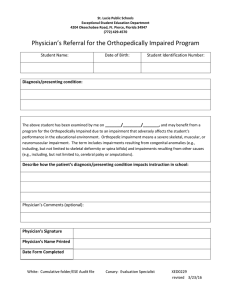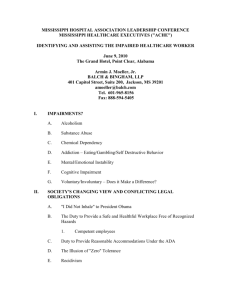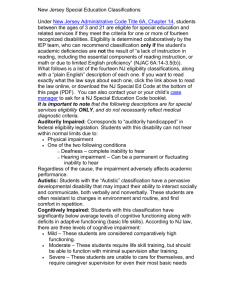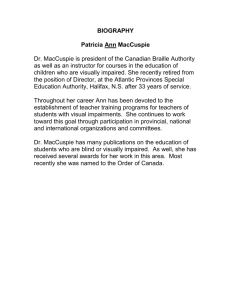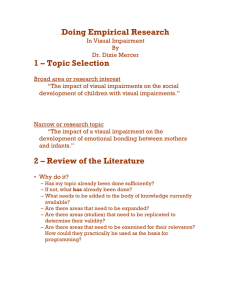POLICIES AND PROCEDURES University of California, Davis Medical Center Medical Staff Administration Policy:
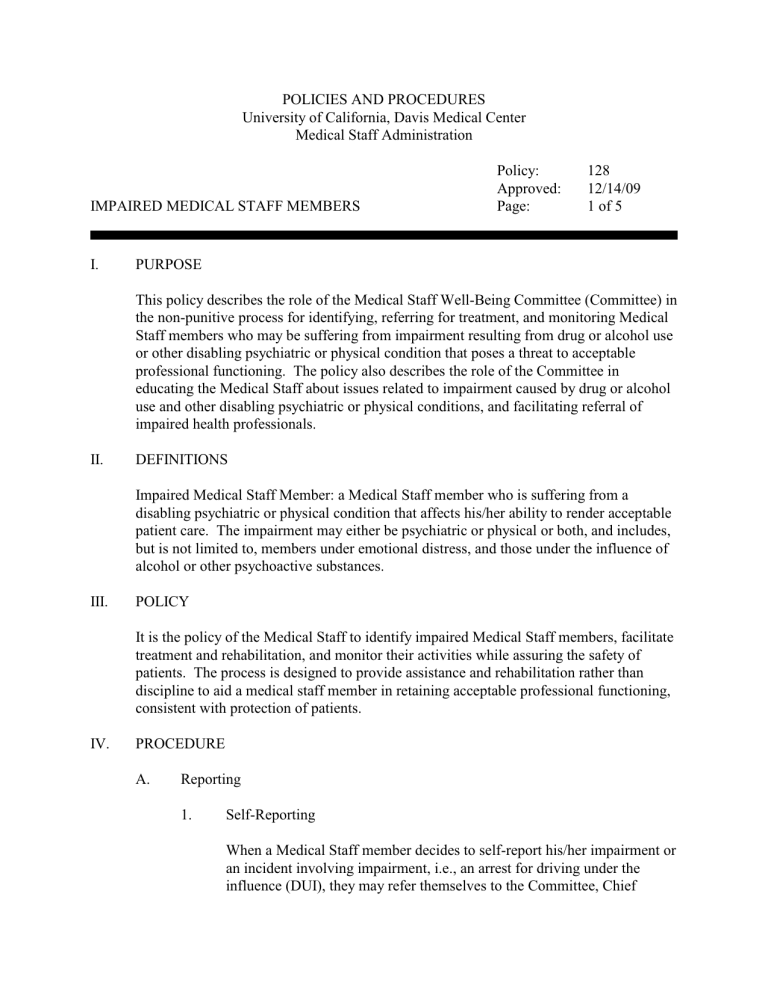
POLICIES AND PROCEDURES
University of California, Davis Medical Center
Medical Staff Administration
IMPAIRED MEDICAL STAFF MEMBERS
Policy: 128
Approved: 12/14/09
Page: 1 of 5
I.
II.
PURPOSE
This policy describes the role of the Medical Staff Well-Being Committee (Committee) in the non-punitive process for identifying, referring for treatment, and monitoring Medical
Staff members who may be suffering from impairment resulting from drug or alcohol use or other disabling psychiatric or physical condition that poses a threat to acceptable professional functioning. The policy also describes the role of the Committee in educating the Medical Staff about issues related to impairment caused by drug or alcohol use and other disabling psychiatric or physical conditions, and facilitating referral of impaired health professionals.
DEFINITIONS
Impaired Medical Staff Member: a Medical Staff member who is suffering from a disabling psychiatric or physical condition that affects his/her ability to render acceptable patient care. The impairment may either be psychiatric or physical or both, and includes, but is not limited to, members under emotional distress, and those under the influence of alcohol or other psychoactive substances.
III.
POLICY
It is the policy of the Medical Staff to identify impaired Medical Staff members, facilitate treatment and rehabilitation, and monitor their activities while assuring the safety of patients. The process is designed to provide assistance and rehabilitation rather than discipline to aid a medical staff member in retaining acceptable professional functioning, consistent with protection of patients.
IV.
PROCEDURE
A.
Reporting
1.
Self-Reporting
When a Medical Staff member decides to self-report his/her impairment or an incident involving impairment, i.e., an arrest for driving under the influence (DUI), they may refer themselves to the Committee, Chief
POLICIES AND PROCEDURES
University of California, Davis Medical Center
Medical Staff Administration
IMPAIRED MEDICAL STAFF MEMBERS
Policy: 128
Approved: 12/14/09
Page: 2 of 5
B.
C.
2.
Medical Officer, Department Chair, or Training Program Director (for residents and fellows).
Third Party Reporting a.
b.
Any person may report their suspicion that a Medical Staff member has an impairment problem to the Committee, Chief Medical
Officer, appropriate Department Chair or appropriate Training
Program Director (for residents).
If an observer suspects that a Medical Staff member may be practicing in an impaired state, which may reasonably be thought to pose a possible risk to patients, the following procedure will be followed: i.
ii.
Observer will notify supervisor or department head.
Supervisor or department head will make an assessment of whether there is imminent danger to patients. The supervisor will call the Chief Medical Officer or, after business hours, the Medical Officer of the Day (MOD).
iii.
The Chief Medical Officer or physician-designee will come to the unit and will meet in a private location with the member who is suspected of being impaired and will make a determination regarding the allegation as outlined in C.
below. Additional appropriate consultation may be requested as required.
When a member is suspected of impairment, the matter will be referred to the
Committee or Chief Medical Officer, where a confidential process will occur that will attempt to validate whether or not the Medical Staff member has an impairment problem.
Treatment and monitoring
POLICIES AND PROCEDURES
University of California, Davis Medical Center
Medical Staff Administration
IMPAIRED MEDICAL STAFF MEMBERS
Policy: 128
Approved: 12/14/09
Page: 3 of 5
1.
2.
3.
4.
If it is determined that a Medical Staff member may have an impairment problem, such individual will be referred to the Committee. The Committee chair or designee will work with the Medical Staff member to coordinate for evaluation and treatment.
The individual will be placed on “leave of absence status” during the initial evaluation and treatment process until cleared to return to patient care activities.
A monitoring agreement (template attached) will be drafted to address the individual circumstances and needs of the impaired Medical Staff member and specify the conditions under which he/she can return to patient care activities. The monitoring agreement will be signed by the monitored
Medical Staff member, the case manager, the Committee chair, the Chief
Medical Officer, the department chair or training program director, and the workplace monitor.
The roles of the case manager and workplace monitor will be described in the monitoring agreement. The case manager will monitor compliance with all aspects of the monitoring agreement and the will notify the Committee chair or the Chief Medical Officer immediately if the monitored individual is impaired or unable to provide safe patient care.
5.
6.
Tracking and updating monthly monitoring agreements. The Chair of the
Well-Being Committee is responsible for receiving information from any case managers or treating providers who are working with monitored medical staff members, and who are identified in the individual agreements as needing to send regular reports. The Chair will ensure that reports are received at agreed intervals, and will personally follow up any providers who have not sent in reports in the agreed timeframe. The Chair of the Wellbeing
Committee will report any monitored members whose monitoring has been problematic to the next monthly committee meeting for discussion.
Six monthly benchmark contract reviews. All Monitored Medical Staff will be discussed at the Well-Being Committee every six months as a minimum.
POLICIES AND PROCEDURES
University of California, Davis Medical Center
Medical Staff Administration
IMPAIRED MEDICAL STAFF MEMBERS
Policy: 128
Approved: 12/14/09
Page: 4 of 5
D.
E.
F.
G.
7.
8.
A list of review dates for these discussions will be held by the Committee administrative staff. At these meetings a full review of progress will be undertaken, and any suggestions for alterations in possible monitoring agreements aired and discussed.
Agreement Modification Process. It is assumed that the majority of agreements will be undertaken for at least as long as originally planned, and usually for at least 3 years in the case of medical staff members with alcohol or substance abuse/dependence related problems. It is accepted that agreements will need to be changed over time, but potential changes need to be agreed by the Well-Being Committee before they are confirmed with the monitored medical staff. Requests for such changes can be brought to any
Committee meeting by either the Chair, on behalf of the monitored member, or by any committee member.
Compliance with the requirements of the monitoring agreement will be taken into consideration when the Medical Staff considers a privileging decision on an impaired member.
In circumstances when an individual suspected of suffering from impairment refuses to voluntarily cooperate with efforts to validate the impairment or enter into a monitoring agreement with the Committee, the matter will be reported to the Chief Medical Officer for possible initiation of corrective action as outlined in the Bylaws of the Medical Staff.
If a formal investigation of a physician’s ability to practice his/her profession safely is undertaken on direction of the Medical Staff Executive Committee, the matter may require the Medical Staff to make a report to the Medical Board of
California or the appropriate licensing board, as described in Section 821.5 of the
Business and Professions Code.
Confidentiality will be maintained in all discussions and with all documentation and records regarding impaired Medical Staff members.
All reasonable efforts will be made to enable impaired Medical Staff members to return to safe clinical practice.
POLICIES AND PROCEDURES
University of California, Davis Medical Center
Medical Staff Administration
IMPAIRED MEDICAL STAFF MEMBERS
Policy: 128
Approved: 12/14/09
Page: 5 of 5
IV.
MEDICAL STAFF WELL-BEING COMMITTEE
The educational role of the Medical Staff Well-Being Committee is to:
A.
Educate the Medical Staff and other members of the organization about illness and recognition of signs of possible impairment.
B.
Enhance the safety of patients, Medical Staff, trainees, and other UCDMC employees.
